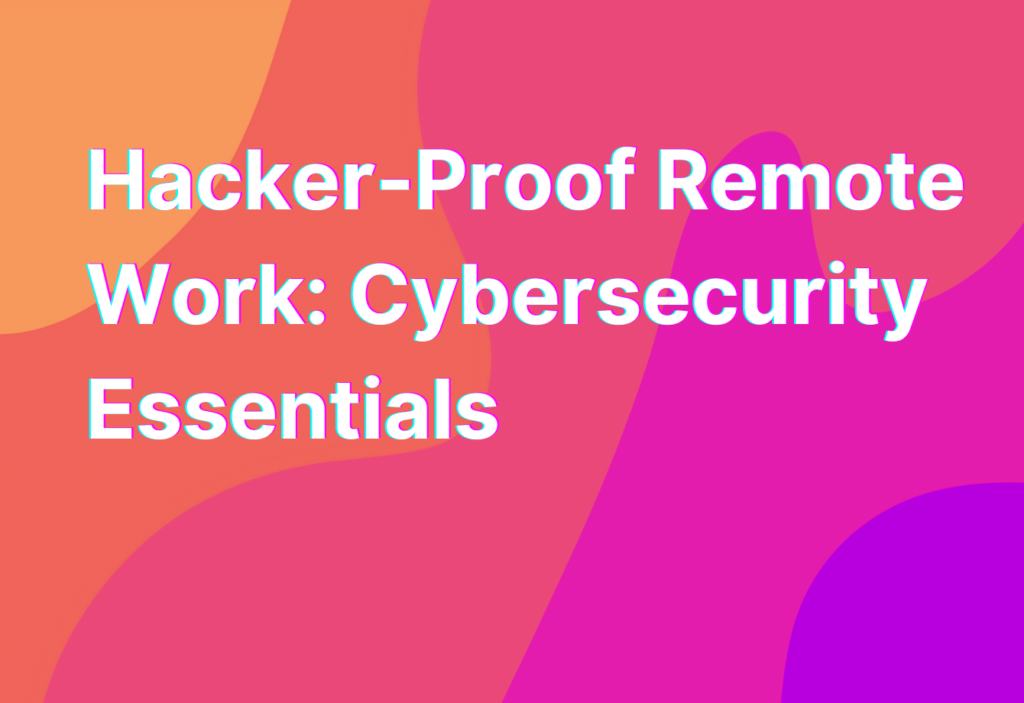Hacker-Proof Remote Work: Cybersecurity Essentials
Welcome back, remote work enthusiasts! Today, we’re diving into the world of cybersecurity and how to keep those pesky hackers at bay. As remote workers, we rely heavily on technology to get our jobs done, but with great power comes great responsibility. It’s crucial to take the necessary precautions to protect our sensitive information and maintain a secure remote work environment. So, grab your virtual shield and let’s get started!
1. Strong Passwords: Your First Line of Defense
Let’s face it, we’ve all been guilty of using “password123” at some point in our lives. But when it comes to remote work, weak passwords are a hacker’s best friend. It’s time to level up our password game, folks! Create unique, complex passwords for each of your accounts, and consider using a password manager to keep track of them all. Remember, the longer and more random your password, the harder it is for hackers to crack.
2. Two-Factor Authentication: Double the Protection
Adding an extra layer of security to your remote work arsenal is as easy as enabling two-factor authentication (2FA). This nifty feature requires you to provide a second form of verification, such as a fingerprint scan or a unique code sent to your phone, in addition to your password. It may seem like a hassle, but trust me, it’s worth it. Hackers will have a much harder time accessing your accounts if they need more than just your password.
3. Keep Your Software Up to Date: Don’t Be a Sitting Duck
Software updates may seem like a nuisance, but they’re actually your best defense against hackers. Developers are constantly working to patch security vulnerabilities and improve the overall performance of their software. By keeping your operating system, apps, and antivirus software up to date, you’re ensuring that you have the latest security patches installed. So, the next time your computer prompts you to update, don’t ignore it!
4. Beware of Phishing Attacks: Hook, Line, and Sinker
Phishing attacks are like the chameleons of the cyber world – they can disguise themselves as legitimate emails, websites, or even phone calls. These sneaky hackers are after one thing: your personal information. To protect yourself, always double-check the sender’s email address, hover over links before clicking on them, and never share sensitive information unless you’re absolutely certain of the recipient’s identity. Remember, when in doubt, throw it out!
5. VPN: Your Secret Tunnel to Security
Imagine a secret tunnel that connects you to the internet, shielding your online activities from prying eyes. That’s exactly what a Virtual Private Network (VPN) does. By encrypting your internet connection and masking your IP address, a VPN adds an extra layer of security when you’re working remotely. So, whether you’re sipping coffee at your favorite café or working from the comfort of your own home, make sure to activate your VPN for that added peace of mind.
Wrapping Up
And there you have it, folks – our top cybersecurity essentials for hacker-proof remote work. Remember, protecting your sensitive information is not a one-time task, but an ongoing effort. Stay vigilant, keep your software up to date, and always be on the lookout for potential threats. By following these cybersecurity best practices, you’ll be well-equipped to navigate the remote work landscape safely and securely.
For more information on identity theft and other cybersecurity essentials for remote work, check out this informative article. Stay safe out there, and until next time, happy remote working!


